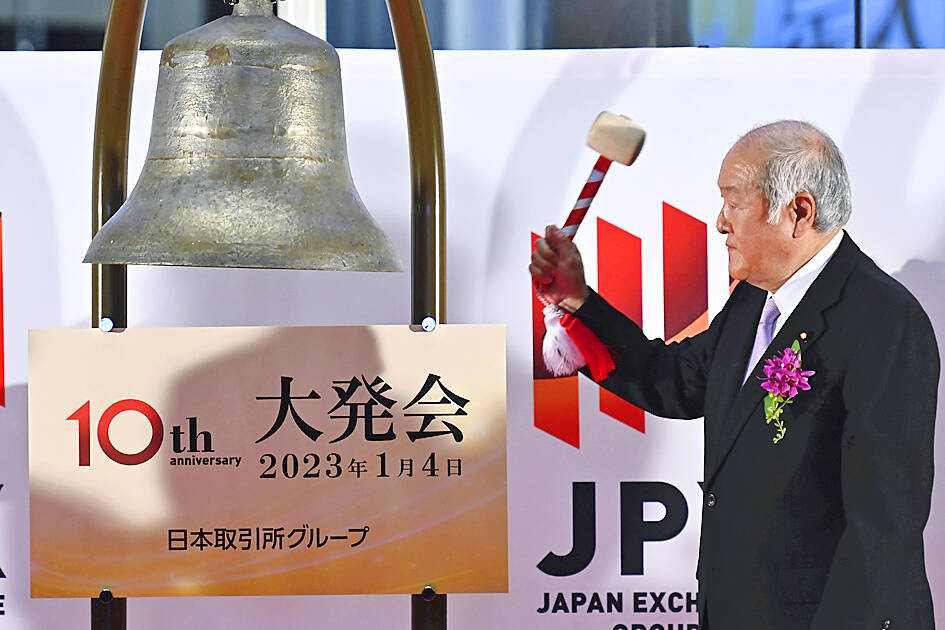Japan’s finances are becoming increasingly precarious, Minister of Finance Shunichi Suzuki warned on Monday, just as markets test whether the central bank can keep interest rates ultra-low, allowing the government to service its debt.
Japan’s public debt is more than double its annual economic output, by far the heaviest burden in the industrialized world.
The government has been helped by near-zero bond yields, but bond investors have recently sought to break the Bank of Japan’s (BOJ) 0.5 percent cap on the 10-year bond yield, as inflation runs at 41-year highs, double the central bank’s 2 percent target.

Photo: AP
“Japan’s public finances have increased in severity to an unprecedented degree as we have compiled supplementary budgets to respond to the coronavirus and similar issues,” Suzuki said in a policy speech starting a session of parliament.
Suzuki reiterated the government’s aim to achieve an annual budget surplus — excluding new bond sales and debt-servicing costs — in the fiscal year to March 2026.
The government, however, has missed budget-balancing targets for a decade. The Ministry of Finance estimates that every 1 percentage point rise in interest rates would boost debt service by ¥3.7 trillion (US$28.4 billion) to ¥32.5 trillion (US$249.9 billion) for the 2025/2026 fiscal year.
“The government will strive to stably manage Japanese government bond [JGB] issuance through close communication with the market,” he said. “Overall JGB issuance, including rolling over bonds, remains at an extremely high level worth about ¥206 trillion. We will step up efforts to keep JGB issuance stable.”
“Public finance is the cornerstone of a country’s trust. We must secure fiscal space under normal circumstances to safeguard trust in Japan and people’s livelihood at a time of emergency,” Suzuki added.
Japanese Prime Minister Fumio Kishida echoed Suzuki’s resolve to revive the economy and tackle fiscal reform. He stressed the need for a positive cycle of growth led by corporate profits and private consumption, which accounts for more than half of the economy.
“Wage hikes hold the key to this virtuous cycle,” Kishida said in his policy speech. He vowed to push labor reform to create a structure that allows sustainable wage growth and overcomes the pain of rising living costs.
“First of all, we need to realize wage growth that exceeds price increases,” Kishida added, pledging to also boost childcare support, and push investment and reform in areas such as green and digital transformation.
The government would unveil a blueprint for “job-based” pay by June, Kishida said, calling the shift a matter of urgency for corporate growth.
“Regardless of age and gender, we will set up a system to provide support straight through from reskilling to changing jobs. We’ll look at retraining from a longer-term perspective,” he said.

Nissan Motor Co has agreed to sell its global headquarters in Yokohama for ¥97 billion (US$630 million) to a group sponsored by Taiwanese autoparts maker Minth Group (敏實集團), as the struggling automaker seeks to shore up its financial position. The acquisition is led by a special purchase company managed by KJR Management Ltd, a Japanese real-estate unit of private equity giant KKR & Co, people familiar with the matter said. KJR said it would act as asset manager together with Mizuho Real Estate Management Co. Nissan is undergoing a broad cost-cutting campaign by eliminating jobs and shuttering plants as it grapples

PERSISTENT RUMORS: Nvidia’s CEO said the firm is not in talks to sell AI chips to China, but he would welcome a change in US policy barring the activity Nvidia Corp CEO Jensen Huang (黃仁勳) said his company is not in discussions to sell its Blackwell artificial intelligence (AI) chips to Chinese firms, waving off speculation it is trying to engineer a return to the world’s largest semiconductor market. Huang, who arrived in Taiwan yesterday ahead of meetings with longtime partner Taiwan Semiconductor Manufacturing Co (TSMC, 台積電), took the opportunity to clarify recent comments about the US-China AI race. The Nvidia head caused a stir in an interview this week with the Financial Times, in which he was quoted as saying “China will win” the AI race. Huang yesterday said

TEMPORARY TRUCE: China has made concessions to ease rare earth trade controls, among others, while Washington holds fire on a 100% tariff on all Chinese goods China is effectively suspending implementation of additional export controls on rare earth metals and terminating investigations targeting US companies in the semiconductor supply chain, the White House announced. The White House on Saturday issued a fact sheet outlining some details of the trade pact agreed to earlier in the week by US President Donald Trump and Chinese President Xi Jinping (習近平) that aimed to ease tensions between the world’s two largest economies. Under the deal, China is to issue general licenses valid for exports of rare earths, gallium, germanium, antimony and graphite “for the benefit of US end users and their suppliers

Dutch chipmaker Nexperia BV’s China unit yesterday said that it had established sufficient inventories of finished goods and works-in-progress, and that its supply chain remained secure and stable after its parent halted wafer supplies. The Dutch company suspended supplies of wafers to its Chinese assembly plant a week ago, calling it “a direct consequence of the local management’s recent failure to comply with the agreed contractual payment terms,” Reuters reported on Friday last week. Its China unit called Nexperia’s suspension “unilateral” and “extremely irresponsible,” adding that the Dutch parent’s claim about contractual payment was “misleading and highly deceptive,” according to a statement